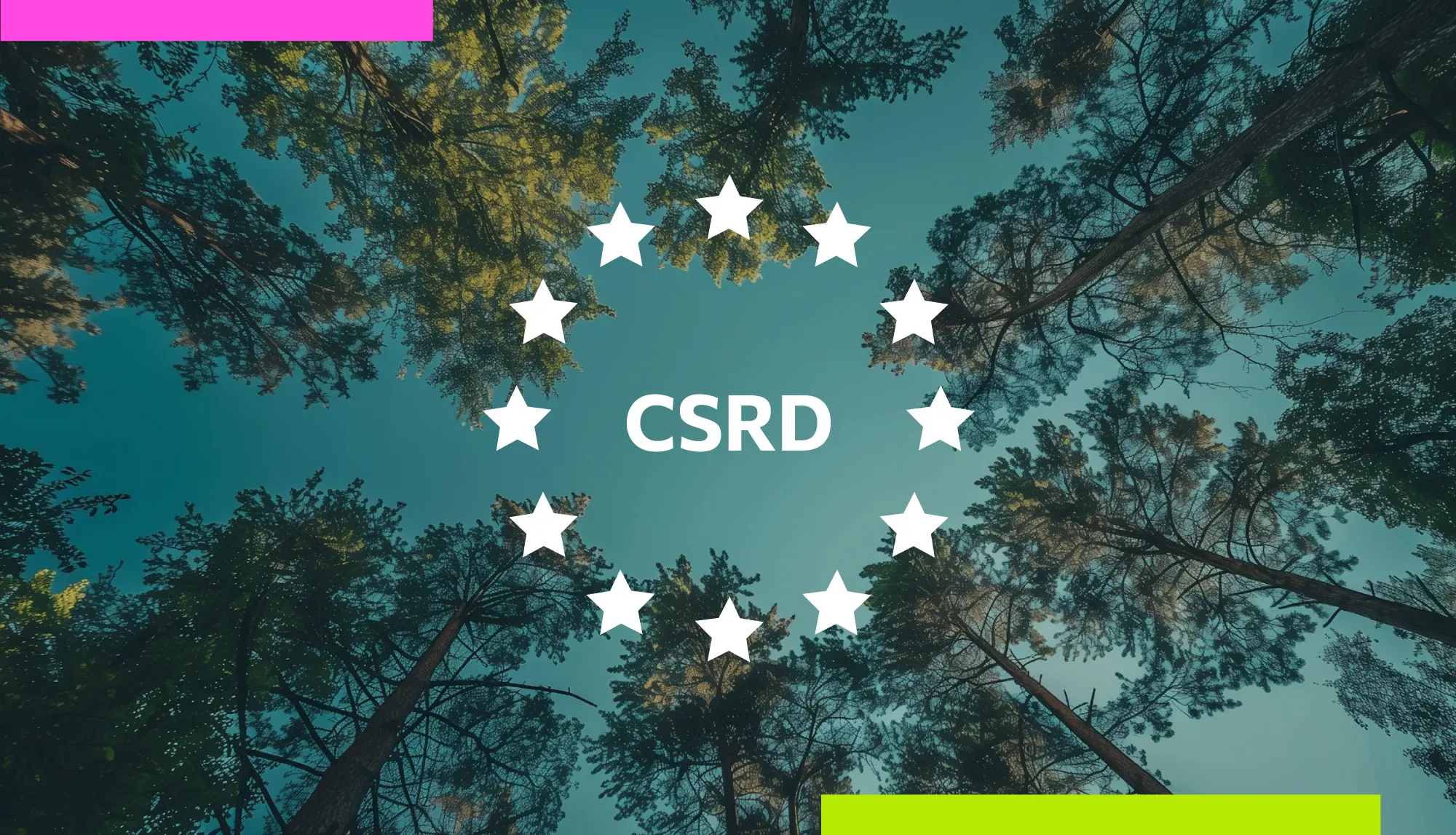
CSRD Directive: Everything You Need to Know About the Corporate Sustainability Reporting Directive
October 22, 2024
The European Commission has published the final regulation that strengthens the Corporate Sustainability Reporting Directive (CSRD). This regulation establishes the European Sustainability Reporting Standards (ESRS), which will be mandatory for all companies within the scope of the CSRD in the European Union. These standards aim to ensure that companies provide clear, consistent, and comparable information on their environmental, social, and governance impacts, thus contributing to greater transparency in corporate sustainability.
¿What is CSRD?
On January 5, 2023, the Corporate Sustainability Reporting Directive (CSRD) came into effect, replacing the requirements set by the previous Non-Financial Reporting Directive (NFRD), which had been in force since 2018.
The CSRD represents a significant shift by expanding the number of companies required to disclose sustainability information, while also introducing much more detailed requirements. These include the preparation of more precise reports, greater focus on strategy and business models, due diligence, governance, risk and opportunity management, as well as the definition of objectives and metrics. Additionally, the regulation provides more comprehensive guidelines on environmental, social, and governance factors, known as ESG (Environmental, Social, Governance) criteria.

The Goal of CSRD: Driving Impact Innovation
The CSRD not only aims to increase transparency in sustainability practices but also to foster impact innovation. This concept refers to the development of new ideas, technologies, or solutions that, in addition to driving technological and commercial advances, create a positive and significant change in society, the environment, and the economy.
79% of companies that adopt impact-driven strategies report greater competitiveness. Examples include companies like Patagonia, whose sustainability practices have strengthened its reputation; Unilever, which has grown thanks to more eco-friendly products and campaigns like Dove’s self-acceptance initiatives; and Tesla, which has revolutionized the market by creating 100% electric vehicles. Even Philip Morris, a tobacco giant, has surprised many by claiming to lead in sustainability, generating headlines like Bloomberg's: "Thank You for Smoking and Saving the Planet."
The primary objective of the CSRD is to ensure greater consistency and comparability in companies' sustainability reporting. This will be made possible through the European Sustainability Reporting Standards (ESRS), aligned with the EU Taxonomy, which will help mitigate the risks of greenwashing. Companies will be required to report carbon emissions across their entire value chain, including Scope 3 emissions, which involve aspects such as energy consumption and the efficiency of cloud services used.
Additionally, the CSRD introduces the concept of double materiality, which requires companies not only to report on the impact of environmental and social factors on their business but also on how their operations affect society and the environment. This reinforces the obligation to comply with stricter and more detailed criteria, and companies will be subject to audits and penalties comparable to those governing financial reporting in cases of non-compliance.
The urgency behind this regulation is no coincidence. The growing scientific evidence regarding climate change and biodiversity loss, combined with market and consumer pressure, has led Europe to take more serious measures to ensure that companies act responsibly, transparently, and sustainably.

Which Companies Are Affected by CSRD?
The CSRD significantly expands the number of companies required to comply with the new sustainability reporting requirements. It is estimated to affect around 50,000 entities across the European Union, gradually coming into effect for fiscal years beginning on January 1, 2024. Initially, entities already reporting under the previous Non-Financial Reporting Directive (NFRD) will need to do so for the 2024 fiscal year, with their reports available at the beginning of 2025. Starting with the 2025 fiscal year (reports available in 2026), additional entities that meet the CSRD scope criteria will be included, and listed small and medium-sized enterprises will be required to comply starting in 2026. Subsidiaries of third-country companies operating in the EU must comply starting in the 2028 fiscal year.
The regulation will affect all entities that meet at least two of the following three criteria for two consecutive years:
- Have more than 250 employees (those with fewer than 750 employees may delay reporting on Scope 3).
- Have a balance sheet total exceeding €20 million.
- Have annual revenues exceeding €40 million.
Additionally, the CSRD introduces strict audit measures and penalties for non-compliance, which will be comparable to penalties imposed for the inadequate presentation of financial reports. This regulation underscores that Europe is taking the need for greater transparency and corporate accountability seriously. The pressure comes not only from legislation but also from the increasing market demand and scientific evidence regarding the urgency to act against climate change and biodiversity loss.

Technology and Sustainability: The Key to Efficient Reporting
The implementation of the Corporate Sustainability Reporting Directive not only demands greater transparency and consistency in sustainability reporting but also requires companies to adopt a strategic approach to data collection and analysis. This is crucial not only for meeting regulatory requirements but also for guiding business decision-making more effectively.
The double materiality approach introduced by the CSRD emphasizes the need to consider both the impact of social and environmental factors on the business and the impact of business operations on the environment and society. To meet these new standards, companies must have digital tools and solutions that enable accurate data collection and analysis. Advanced technologies like artificial intelligence (AI) can play a crucial role in this process, allowing companies to automate reporting and analyze large volumes of information efficiently.
In this regard, in our upcoming Webinar where we will discuss Sustainability: AI and Automation for CSRD, we will explore in detail how companies can optimize their reporting processes using key technologies. We will discuss strategies, work plans, and tools that can facilitate the creation of reports under CSRD standards, and how these solutions can be integrated into the business strategy to generate accurate and useful reports. If you are working on implementing CSRD, I encourage you to attend live, where you will also have the opportunity to resolve all your questions with experts in the field.
Sustainability as a Key to Business Future
In line with the efforts of the CSRD, the European Union's Deforestation Regulation (EUDR) reinforces the commitment to curb deforestation linked to the consumption of products in Europe. This regulation requires companies operating in the EU to verify that the products they import or sell, such as palm oil, soy, coffee, cocoa, timber, and its derivatives, do not come from land deforested after 2020. Non-compliance with this regulation could result in fines of up to 4% of the company's total turnover.
The convergence of sustainability and digital transformation has become a critical element for companies seeking to maintain their leadership in a competitive environment. Innovating sustainably allows organizations to address complex problems from a different perspective, optimizing processes and creating products with a reduced environmental impact. A clear example of this fusion is Airbus's Fello'fly initiative, which, inspired by the V formations of birds, has managed to reduce energy consumption in flights by 5% to 10%, thanks to a biomimicry approach.
Our latest news
Interested in learning more about how we are constantly adapting to the new digital frontier?

Insight
February 5, 2025
Pharmaceutical tenders: top 5 obstacles and how to overcome them

Tech Insight
January 13, 2025
How to bring your application closer to everyone

Insight
December 10, 2024
Groundbreaking technologies today that will reshape the innovation landscape in 2025

Insight
December 3, 2024
Sustainable Development: Minimizing Digital Footprint and Optimizing Consumption

